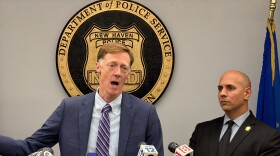Moccasins, pipes and other items believed to have been taken off the bodies of slaughtered native people are on their way home, from Massachusetts to South Dakota. This follows years of negotiations between a tiny museum in Barre, and descendants of survivors of the Wounded Knee massacre.
As a large crowd filled the seats in the Ruggles Lane School gym, Cedric Broken Nose of the Oglala Lakota Nation said he learned what happened at Wounded Knee from his grandmother, Flossie Pipe on Head. She learned it from her father, James Pipe on Head, who survived the massacre as a boy.
"He grew up as a 12-year-old in boarding schools and mission schools, because there were no parents. His parents were killed there at Wounded Knee," Broken Nose said.
In the late 1800s, Frank Root, a traveling showman, donated items to the museum. Evidence suggests at least some had been removed from the bodies of those massacred at Wounded Knee.
Standing outside the school, Michael He Crow from Pine Ridge reservation said the objects still embody the spirit of those killed by U.S. soldiers in 1890.
"They are more than just objects. They are almost a part of their bodies. So when they were taken from them, it's like taking a part of those people," he said.
He Crow pointed out the items were not only taken — but displayed. He said they need to be returned so the spirit of the person who died can cross over into the next world.
The more than 100 items have been packed in archival materials to protect them. So on Saturday, an empty box, with a list of items taped to it, was symbolically handed over
"Today we gather here for a major step towards healing," Richard Moves Camp, a Lakota spiritual leader, told the crowd.
He said getting the items back is important especially for descendants of those killed.
"They carry intergenerational pain. But today we pray there will be a closure and then there will be a new generation of all walking together," he said.
Moves Camp said it's rare for his people to fill a sacred pipe in public. But on this day, they did, and prayed for future generations.
Since at least the 1990s, members of the tribe have visited Barre asking for the items to be returned. The museum resisted, questioning where the items came from and who they should be returned to.
Native leaders stepped up public pressure earlier this year and the museum board voted to begin the repatriation process. Now board president Ann Meilus said it's her great honor to return the objects to the Lakota.
"A nation that has suffered a great wrong at the hands of the U.S. government for the unwarranted slaughter of its innocent people. And for that I am truly sorry," she said.
President of the Oglala Lakota Nation Kevin Killer told the crowd, we have to have these difficult conversations.
"But we shouldn’t run away from them, honestly," Killer said. "You can’t change what happened in the past. I know that, but we can change what the future looks like."
Before singing a prayer, Ivan Looking Horse had a request for the crowd
"If you know of any other sacred items out there, we would like to get them returned to our nation again. Some of them are probably overseas. So we want to also get those returned," he said.

As the ceremony ended, the Oglala Lakota wrapped handmade quilts around the members of the museum board.
Cedric Broken Nose is driving the items back to South Dakota. Young people from the tribe are going with him so they can pass this story on to future generations.








